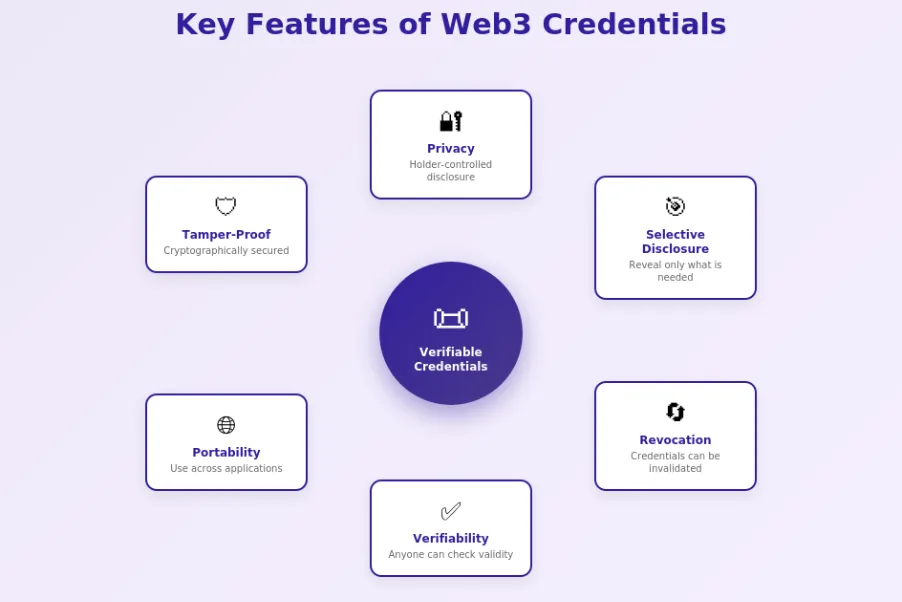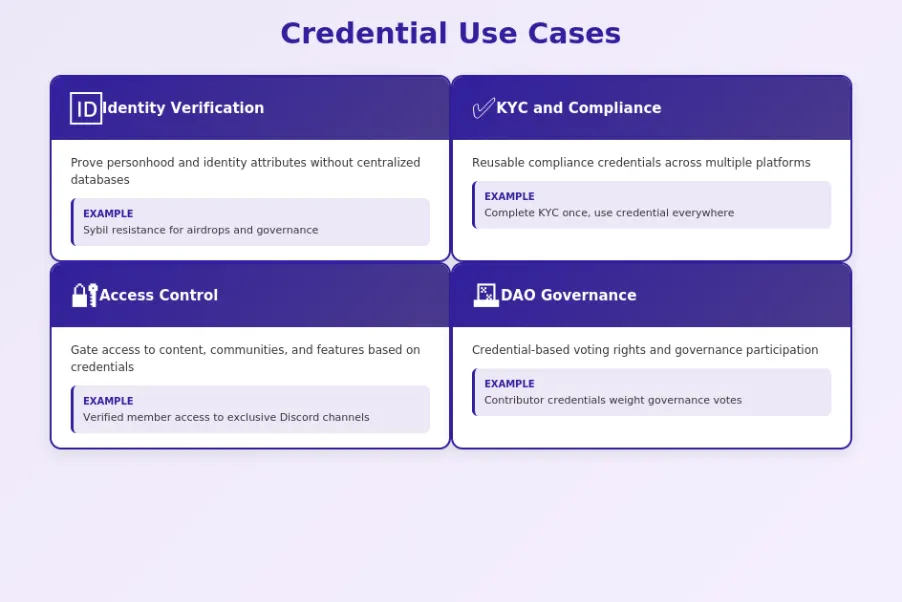Key Takeaways
- Web3 credential issuers are platforms and entities that create cryptographically signed digital credentials on Ethereum, enabling verifiable claims about identity, qualifications, and attributes without centralized authorities
- Web3 credential issuers on Ethereum use smart contracts and DIDs to anchor credential proofs, with options for on-chain transparency or off-chain privacy depending on use case requirements
- The issuer-holder-verifier model underpins decentralized credential issuers, where issuers sign credentials, holders control and present them, and verifiers independently validate authenticity
- Key Ethereum credential issuers include Gitcoin Passport, Polygon ID, Sismo, Galxe, POAP, and Veramo, each specializing in different credential types from reputation scores to KYC attestations
- Privacy-preserving features like selective disclosure and zero-knowledge proofs distinguish modern Web3 identity credential issuers from traditional certificate authorities
- Verifiable credential issuers must balance security, scalability, compliance, and interoperability when choosing standards like W3C Verifiable Credentials and DID methods
- Ethereum-based credential platforms serve diverse use cases including decentralized identity verification, Web3 KYC compliance, DAO governance, and access control for dApps
- Evaluating Web3 credentials on Ethereum requires assessing issuer trustworthiness, credential revocation capabilities, ecosystem compatibility, and long-term sustainability
- The future of verifiable credentials in Web3 points toward increased zero-knowledge adoption, enterprise integration, and potential government recognition of blockchain-based credentials
What Are Web3 Credential Issuers?
Web3 credential issuers represent a fundamental shift in how digital credentials are created, managed, and verified. These platforms and entities leverage blockchain technology to issue tamper-proof credentials that users control, eliminating dependence on centralized certificate authorities while enabling trustworthy verification across the decentralized ecosystem.
Definition of Web3 Credential Issuers
Web3 credential issuers are entities that create and cryptographically sign digital credentials attesting to claims about a holder’s identity, qualifications, achievements, or attributes. Unlike traditional credential authorities that maintain centralized databases, Web3 credential issuers on Ethereum anchor their attestations to blockchain-based identities (DIDs or wallet addresses), enabling independent verification without requiring trust in or access to the issuer’s systems.
These credentials take various forms: verifiable credentials following W3C standards, soulbound tokens (non-transferable NFTs), on-chain attestations, or hybrid models combining on-chain proofs with off-chain data storage. The common thread is cryptographic signatures that prove the issuer attested to specific claims about the holder at a verifiable point in time.
Role of Issuers in the Web3 Identity Ecosystem
Credential issuers play a critical trust role in the Web3 identity ecosystem. They bridge real-world verification with on-chain representation, attesting that holders possess certain attributes, completed certain actions, or meet certain criteria. The value of a credential depends entirely on the trustworthiness and reputation of its issuer.
Different issuers serve different trust domains. A KYC provider issues compliance credentials trusted by regulated platforms. A university issues educational credentials trusted by employers. A DAO issues membership credentials trusted by governance systems. This diversity of decentralized credential issuers creates a rich ecosystem where credentials from various trusted sources can be combined and verified.
How Credential Issuers Work on Ethereum?
Understanding the technical mechanics of credential issuance on Ethereum reveals how these systems achieve trustless verification while maintaining flexibility for different privacy and scalability requirements.
Credential Issuance Using Smart Contracts
Smart contracts enable several patterns for credential issuance on Ethereum. Registry contracts maintain on-chain records of issued credentials, allowing anyone to verify credential existence and validity. Soulbound token contracts mint non-transferable NFTs representing credentials directly to holder addresses. Attestation contracts record issuer signatures with references to off-chain credential data.
The smart contract provides the trust anchor: its address is immutable, its code is transparent, and its state is verifiable by anyone. Issuers interact with these contracts using their verified keys, creating permanent records of attestations that cannot be falsified or backdated.
On-Chain vs Off-Chain Credential Storage
On-chain credentials store all credential data directly on Ethereum, providing maximum transparency and permanence. However, this approach exposes data publicly (problematic for personal information) and incurs gas costs that scale with data size. On-chain storage suits public credentials like event attendance or community membership.
Off-chain credentials store sensitive data privately (often encrypted with the holder) while anchoring verification proofs on-chain. The blockchain might store only a hash, a revocation registry entry, or an issuer attestation referencing off-chain data. This approach preserves privacy and reduces costs while maintaining verifiability. Most Ethereum-based credential platforms use hybrid approaches optimized for their specific use cases.
Issuer-Holder-Verifier Model
The credential ecosystem operates through three roles: issuers create and sign credentials, holders store and present them, and verifiers check their validity. This model decouples credential creation from verification, enabling credentials to be verified without contacting the issuer and giving holders control over when and to whom they present credentials.
On Ethereum, this model maps to: issuer addresses/DIDs that sign credentials, holder wallets that store credential tokens or off-chain credential files, and verifier applications that check signatures and on-chain state. The blockchain serves as the shared verification layer that all parties trust.
Standards and Frameworks Used by Credential Issuers
Standardization enables interoperability between credential issuers, holders, and verifiers. Understanding the major standards helps evaluate issuer compatibility with broader ecosystem requirements.
W3C Verifiable Credentials Standard
The W3C Verifiable Credentials Data Model provides a standard format for expressing credentials in a way that is cryptographically secure, privacy-respecting, and machine-verifiable. Credentials contain claims about subjects, issuer signatures, and optional proof mechanisms. This standard enables credentials issued by one party to be understood and verified by any compliant system.
Many Web3 identity credential issuers adopt or extend W3C standards, ensuring their credentials can interoperate with the broader identity ecosystem. This standardization is crucial for credentials that must be recognized across multiple platforms and jurisdictions.
Decentralized Identifiers (DIDs) on Ethereum
DIDs provide globally unique identifiers for issuers and holders that do not depend on centralized registries. The did:ethr method uses Ethereum addresses as identifiers, allowing anyone to resolve a DID to its public keys and service endpoints by querying the Ethereum network. Other DID methods exist for different chains and off-chain systems.
DIDs enable issuer verification: when a credential claims to be issued by a specific DID, verifiers can resolve that DID to determine the public keys authorized to sign on its behalf, then verify the credential signature against those keys.
Trust Frameworks for Credential Issuance
Trust frameworks define the rules and requirements for credential issuance within specific domains. A KYC trust framework might require issuers to perform specific identity verification procedures. An educational trust framework might require issuers to be accredited institutions. These frameworks provide the governance layer that gives credentials meaning.
Different ecosystems are building trust frameworks for their credential needs. Regulatory bodies, industry consortia, and decentralized governance organizations all play roles in defining what credentials mean and which issuers can be trusted for which purposes.
| Standard | Purpose | Ethereum Implementation |
|---|---|---|
| W3C VC | Credential data format | JSON-LD credentials with EIP-712 signatures |
| DID:ethr | Decentralized identifiers | Ethereum addresses as DIDs |
| EIP-712 | Typed data signing | Human-readable credential signatures |
| ERC-721/5192 | Soulbound tokens | Non-transferable credential NFTs |
Key Features of Web3 Credential Issuers

Modern verifiable credential issuers incorporate advanced features that distinguish them from traditional certificate authorities, enabling privacy-preserving, user-controlled credential systems.
Privacy-Preserving Credential Design
Privacy-preserving credentials protect holder information while still enabling verification. Zero-knowledge proof techniques allow proving possession of valid credentials without revealing credential contents. Holder-controlled disclosure ensures holders decide what information to share with each verifier. Unlinkable presentations prevent verifiers from correlating holder activity across different verification contexts.
These privacy features address a fundamental limitation of traditional credentials: presenting them typically reveals all information to all verifiers. Web3 credentials on Ethereum can be designed to reveal only what is necessary for each specific verification scenario.
Selective Disclosure Capabilities
Selective disclosure allows holders to present only specific claims from a credential rather than the entire document. A driver’s license credential might contain name, birth date, address, and photo, but selective disclosure enables proving only that you are over 21 without revealing your exact birth date or other information.
Different technical approaches enable selective disclosure: credential formats that support claim-by-claim signatures, zero-knowledge proofs that prove specific properties, or derived credentials that contain only subset information. The best verifiable credentials in Web3 support flexible disclosure models.
Credential Revocation and Updates
Credentials must be revocable when circumstances change: employment ends, certifications expire, or credentials are issued in error. On Ethereum, revocation typically uses on-chain registries that verifiers check, accumulator-based schemes that enable privacy-preserving revocation checking, or time-bound credentials that expire automatically.
Updates present different challenges. Some credential systems support versioning, where new credentials supersede old ones. Others use amendment patterns where changes are recorded without invalidating original credentials. The revocation and update model affects both issuer operations and verifier implementation.
Criteria to Evaluate Web3 Credential Issuers
Selecting the right credential issuer requires systematic evaluation across multiple dimensions. The criteria below provide a framework for assessment.
Security and Trustworthiness
Security evaluation includes: key management practices (how issuers protect signing keys), verification rigor (how thoroughly claims are checked before attestation), and system security (protection against compromise that could enable fraudulent credentials). Trustworthiness encompasses issuer reputation, track record, and accountability mechanisms.
Compliance and Interoperability
Compliance considerations include regulatory requirements for specific credential types (especially KYC/AML credentials) and data protection obligations. Interoperability assesses whether credentials work with other systems: standard compliance, cross-platform recognition, and ecosystem integration.
Scalability and Cost Efficiency
Scalability matters for issuers handling high volumes: transaction throughput, storage costs, and verification performance. Cost efficiency encompasses gas costs for on-chain operations, infrastructure expenses, and total cost of ownership. Layer 2 solutions and off-chain approaches can dramatically improve scalability and reduce costs.
Developer and Enterprise Support
Practical adoption requires robust support: documentation quality, SDK availability, integration complexity, and responsive technical support. Enterprise deployments need SLAs, compliance certifications, and dedicated account management. Organizations building crypto exchanges and other regulated platforms prioritize issuers with strong enterprise support.
Types of Web3 Credential Issuers on Ethereum
Credential issuers specialize in different domains, each serving distinct needs within the Web3 ecosystem.
Identity-Focused Credential Issuers
Identity-focused issuers provide foundational credentials about who holders are: proof of personhood, social identity verification, and reputation aggregation. These credentials enable Sybil resistance, help platforms ensure users are unique humans, and aggregate identity signals from across the Web3 ecosystem.
Compliance and KYC Credential Issuers
KYC credential issuers perform identity verification to regulatory standards and issue reusable compliance credentials. Holders can then present these credentials to multiple platforms without repeating verification processes. These issuers bridge traditional compliance requirements with Web3 privacy expectations.
Enterprise and Institutional Issuers
Enterprise issuers include organizations issuing credentials about their members, employees, or affiliates: professional certifications, membership attestations, and institutional verifications. Universities, professional bodies, and corporations increasingly explore credential issuance to provide verifiable attestations about their constituents.
| Issuer Type | Primary Purpose | Example Credentials |
|---|---|---|
| Identity-Focused | Personhood and reputation | Passport scores, humanity proofs |
| KYC/Compliance | Regulatory verification | KYC attestations, accreditation |
| Enterprise | Institutional verification | Employment, membership, certifications |
| Community | Participation proof | Event attendance, contributions |
List of Web3 Credential Issuers on Ethereum
The following comprehensive list covers the leading Ethereum-based credential platforms, emerging platforms, and open-source projects that constitute the Web3 credentials on Ethereum ecosystem.
Leading Ethereum-Based Credential Issuers
Polygon ID
Polygon ID stands as one of the most advanced privacy-preserving identity solutions in the Ethereum ecosystem, leveraging zero-knowledge proofs to enable credential verification without revealing underlying data. Built on the Iden3 protocol, Polygon ID allows users to prove claims about themselves while maintaining complete privacy. The system supports both on-chain and off-chain verification, making it versatile for various use cases from DeFi compliance to age verification. Issuers can create custom credential schemas, and the platform integrates seamlessly with the broader Polygon ecosystem. The zero-knowledge architecture means verifiers learn only that a claim is true, nothing more, making it ideal for privacy-sensitive applications. Polygon ID has gained significant adoption among projects requiring compliant yet private identity verification.
Gitcoin Passport
Gitcoin Passport provides a Sybil resistance solution that aggregates identity verification from multiple sources into a unified score. Users collect stamps by verifying accounts across platforms like GitHub, Twitter, Google, and various Web3 services, building a composite identity that demonstrates they are unique humans rather than bots or duplicate accounts. The passport uses a scoring system where different stamps contribute varying weights, allowing applications to set thresholds appropriate for their risk tolerance. Originally created to protect Gitcoin’s quadratic funding from Sybil attacks, Passport has expanded into a general-purpose identity verification tool used across the Web3 ecosystem. The system balances privacy with verification by not exposing underlying account details, only the fact that verification occurred.
Ethereum Attestation Service (EAS)
Ethereum Attestation Service provides a general-purpose infrastructure for creating any type of attestation on Ethereum and its Layer 2 networks. Unlike specialized credential issuers, EAS offers a flexible schema system that allows anyone to define attestation types and issue credentials. The service supports both on-chain attestations (stored directly on Ethereum) and off-chain attestations (stored externally with on-chain references). EAS has become foundational infrastructure for many projects building credential systems, as it handles the core attestation mechanics while allowing customization for specific use cases. The protocol is permissionless and decentralized, meaning anyone can become an issuer and define their own credential schemas.
Worldcoin (World ID)
Worldcoin’s World ID provides proof-of-personhood credentials using biometric verification through their Orb devices. The system creates a unique identifier for each human while using zero-knowledge proofs to preserve privacy, ensuring that biometric data cannot be extracted from the credential. World ID enables applications to verify that users are unique humans without learning their identity, addressing Sybil resistance at a global scale. The credential can be used across applications that integrate World ID verification, creating a portable proof of humanness. While controversial due to its biometric approach, World ID represents one of the most ambitious attempts to solve the proof-of-personhood problem in Web3.
Civic
Civic offers identity verification services that bridge traditional KYC processes with Web3 credential issuance. The platform verifies user identity through government ID checks, liveness detection, and other verification methods, then issues reusable credentials that users can present to participating services. Civic Pass tokens represent verification status on-chain, enabling gated access to applications and services. The system supports multiple verification levels from basic uniqueness checks to full identity verification with document validation. Civic has built significant partnerships with Web3 projects needing compliant onboarding without building their own KYC infrastructure.
Fractal ID
Fractal ID specializes in regulatory-compliant identity verification for Web3 applications, offering KYC, KYB (Know Your Business), and AML services that result in reusable credentials. The platform supports verification across multiple jurisdictions and maintains compliance with various regulatory frameworks. Users complete verification once and receive credentials they can reuse across Fractal-integrated services, reducing friction while maintaining compliance. Fractal has focused particularly on the DeFi and token sale markets, where regulatory compliance is increasingly important. Their approach emphasizes user data sovereignty while meeting institutional compliance requirements.
Galxe (formerly Project Galaxy)
Galxe provides credential infrastructure focused on on-chain achievements, campaign participation, and community engagement. The platform allows projects to create credential campaigns that reward users for completing specific actions, building a record of participation and achievement. Galxe credentials serve both as reputation signals and access tokens for gated experiences. The platform has become particularly popular for NFT drops, community building, and growth campaigns where provable participation history matters. While less focused on identity verification than compliance-oriented issuers, Galxe fills an important niche in the credential ecosystem for activity-based attestations.
Sismo
Sismo enables privacy-preserving attestations using zero-knowledge proofs, allowing users to prove facts about their digital identity without revealing the source. Users can aggregate reputation and credentials from multiple accounts and present proofs without linking those accounts together. This unique approach preserves privacy while enabling reputation portability. Sismo badges serve as ZK attestations that prove membership, ownership, or activity without exposing which account generated the proof. The platform is particularly valuable for users who want to leverage their existing reputation while maintaining address separation.
Emerging Credential Issuer Platforms
Clique
Clique focuses on identity oracles that bring off-chain identity data on-chain in a privacy-preserving manner. The platform enables credentials based on social graph data, professional networks, and other off-chain sources. Their approach uses trusted execution environments and cryptographic techniques to verify data without exposing raw information. Clique is building toward a comprehensive identity layer that bridges Web2 identity sources with Web3 credentials.
Humanbound
Humanbound creates non-transferable soulbound tokens that serve as permanent identity credentials. These tokens cannot be transferred between wallets, making them suitable for credentials that should remain with their original recipient like educational achievements, employment history, or identity verification. The platform enables issuers to create bound credentials that maintain their association with verified individuals.
Orange Protocol
Orange Protocol provides reputation and trust infrastructure for Web3, calculating reputation scores based on on-chain activity and issuing credentials representing these scores. The protocol aggregates data from multiple chains and sources to build comprehensive reputation profiles. Applications can use Orange credentials to gate access or adjust trust levels based on verifiable on-chain history.
Open-Source Credential Issuer Projects
Iden3
Iden3 provides the open-source protocol underlying Polygon ID, offering libraries and tools for building zero-knowledge identity systems. The protocol implements a complete identity framework including identity creation, credential issuance, and privacy-preserving verification. Developers can use Iden3 to build custom credential issuance systems with ZK capabilities, making it foundational infrastructure for the broader ecosystem.
SpruceID
SpruceID develops open-source tools for decentralized identity including Sign-In with Ethereum (SIWE) and credential issuance libraries. Their tools enable developers to integrate wallet-based authentication and verifiable credentials into applications. SpruceID emphasizes standards compliance with W3C specifications, making their tools interoperable with the broader decentralized identity ecosystem.
Veramo
Veramo is a JavaScript framework for verifiable data that supports DIDs, verifiable credentials, and related standards. The modular architecture allows developers to compose identity solutions from interchangeable components. Veramo supports multiple DID methods including Ethereum-based methods, making it suitable for building custom credential issuance systems on Ethereum.
| Issuer | Focus Area | Key Feature | Privacy Level |
|---|---|---|---|
| Polygon ID | Privacy Identity | Zero-Knowledge Proofs | Very High |
| Gitcoin Passport | Sybil Resistance | Multi-Source Scoring | Medium |
| EAS | General Attestations | Flexible Schemas | Configurable |
| Worldcoin | Proof of Personhood | Biometric + ZK | High |
| Civic | KYC Compliance | Reusable KYC | Medium |
| Fractal ID | Regulatory KYC | Multi-Jurisdiction | Medium |
| Galxe | Achievement Credentials | Campaign System | Low |
| Sismo | Privacy Attestations | ZK Aggregation | Very High |
Use Cases of Web3 Credential Issuers

Web3 credential issuers enable diverse applications across identity, compliance, access control, and governance domains.
Decentralized Identity Verification
Credential issuers enable identity verification without centralized databases. Users collect credentials from trusted issuers (government ID verification, biometric checks, social account linking) and present them to applications that need identity assurance. The verification is decentralized: applications check credentials against issuer signatures without maintaining their own identity databases.
Web3 KYC and Compliance
KYC credential issuers perform identity verification to regulatory standards and issue reusable credentials. Holders complete KYC once and use the resulting credential across multiple platforms. This reduces redundant verification, improves user experience, and can enhance privacy by keeping personal data with holders rather than distributed across every platform.
Access Control and Authentication
Credentials enable sophisticated access control: holding specific credentials grants access to restricted content, features, or communities. Token-gating extends beyond simple token ownership to credential-based gating where access depends on verified attributes rather than just asset ownership.
DAO Membership and Governance
DAOs use credentials for governance: membership credentials grant voting rights, contributor credentials unlock permissions, and reputation credentials weight influence. Credentials can represent non-transferable qualifications that should not be purchasable, unlike tokens that can be bought for governance power.
Security Considerations for Credential Issuers
Credential issuer security directly impacts the trustworthiness of issued credentials. Compromised issuers could create fraudulent credentials, undermining the entire system.
Protecting Issuer Keys and Infrastructure
Issuer private keys are critical assets. Compromise would enable unlimited fraudulent credential creation. Best practices include: hardware security modules (HSMs) for key storage, multi-signature requirements for credential operations, access controls and audit logging, and incident response procedures.
Preventing Credential Fraud and Abuse
Issuers must prevent fraudulent credential requests through rigorous verification procedures, detect and respond to abuse patterns, and maintain revocation capabilities for credentials issued in error. The verification rigor before issuance determines credential trustworthiness.
Risk Management in Credential Issuance
Credential issuers face operational risks including key compromise, verification failures, and regulatory liability. Risk management requires clear policies, technical controls, insurance where appropriate, and legal structures that define liability boundaries.
Challenges Faced by Web3 Credential Issuers
Despite promising technology, credential issuers face significant challenges to mainstream adoption.
Scalability Limitations on Ethereum
On-chain credential operations face Ethereum’s throughput and cost constraints. High gas prices during network congestion make credential issuance expensive. Solutions include Layer 2 deployment, off-chain credentials with on-chain anchors, and batched operations that amortize costs across multiple credentials.
Adoption and UX Challenges
User experience remains challenging: managing wallets, understanding credentials, and presenting them correctly requires technical sophistication that mainstream users lack. Issuer adoption is limited by the chicken-and-egg problem where verifiers wait for credentials to exist and issuers wait for verifier demand.
Regulatory Uncertainty
Regulatory treatment of Web3 credentials remains unclear in most jurisdictions. Questions include: legal recognition of blockchain-based credentials, data protection compliance for credential systems, and liability frameworks for issuer mistakes. This uncertainty slows enterprise and government adoption.
Choosing the Right Web3 Credential Issuer
Selection requires matching issuer capabilities with specific use case requirements across multiple dimensions.
Matching Issuer Capabilities with Use Case
Different use cases require different issuer characteristics. KYC credentials need issuers with regulatory compliance expertise. Community credentials need issuers with low-cost, high-volume capabilities. Privacy-sensitive credentials need issuers with zero-knowledge support. Match the issuer’s strengths to your requirements.
Cost, Integration, and Support Factors
Practical considerations include: per-credential costs at expected volumes, integration complexity with existing systems, ongoing maintenance requirements, and support availability. Factor in total cost of ownership rather than just direct fees.
Long-Term Ecosystem Compatibility
Credentials should remain verifiable and useful over time. Evaluate issuer sustainability, standard compliance for long-term interoperability, and ecosystem adoption that ensures continued relevance.
Future of Web3 Credential Issuers on Ethereum
The credential issuer landscape continues evolving with technological advances, increasing adoption, and regulatory developments.
Zero-Knowledge Credentials and Privacy
Zero-knowledge proofs are transforming credential privacy. ZK credentials enable proving attributes without revealing data, verification without correlation, and privacy-preserving revocation checking. Platforms like Polygon ID and Sismo demonstrate this future, which will become standard for privacy-sensitive credentials.
Enterprise and Government Adoption
Enterprises and governments are exploring Web3 credentials for digital identity, professional licensing, and compliance verification. The EU’s eIDAS 2.0 framework explicitly accommodates blockchain-based credentials. Enterprise adoption will drive standardization, compliance frameworks, and matured issuer infrastructure.
Evolution of Decentralized Identity Standards
Standards continue maturing with new DID methods, credential formats, and verification protocols. Cross-chain identity, mobile credential management, and improved revocation mechanisms are active areas. Standards convergence will reduce fragmentation and enable broader interoperability.
Strategic Benefits for Web3 Platforms
Platforms integrating credential verification gain strategic advantages: Sybil-resistant user bases, compliant user access, rich user context from credential attributes, and reduced friction through portable verification. These benefits drive platform adoption of credential infrastructure.
Long-Term Sustainability of Credential Ecosystems
Sustainable credential ecosystems require viable economic models for issuers, holders, and verifiers. Models include verification fees, subscription access, and value-added services built on credential infrastructure. Sustainable economics ensure issuers remain operational and credentials remain verifiable long-term.
| Phase | Stage | Action | Outcome |
|---|---|---|---|
| 1 | Verification | Issuer verifies holder claims | Claims validated |
| 2 | Issuance | Issuer signs credential | Credential created |
| 3 | Storage | Holder receives and stores | Credential held |
| 4 | Presentation | Holder presents to verifier | Credential shared |
| 5 | Verification | Verifier checks validity | Trust established |
Build Credential Solutions Today
Integrate verifiable credentials and decentralized identity into your Web3 applications.
Web3 credential issuers on Ethereum are building the trust infrastructure for the decentralized internet. From identity verification to compliance attestations to community credentials, these platforms enable verifiable claims that users control and verifiers trust. As standards mature, privacy improves, and adoption grows, credential issuers will become essential infrastructure for Web3 applications that need to know who their users are and what they are qualified to do.
Frequently Asked Questions
Verifiable credentials on Ethereum work through a three-party model: issuers create and sign credentials, holders store and present them, and verifiers check their validity. The issuer’s signature is anchored to an Ethereum address or DID (Decentralized Identifier), allowing anyone to verify the credential’s authenticity. Credentials can be stored on-chain, off-chain, or in hybrid models depending on privacy and cost requirements.
Decentralized Identifiers (DIDs) are globally unique identifiers that enable verifiable, self-sovereign digital identity without depending on centralized registries. On Ethereum, DIDs like did:ethr use Ethereum addresses as the basis for identity, allowing users to prove control through cryptographic signatures. DIDs link to DID Documents that specify how to verify credentials and interact with the identity.
Major platforms issuing Web3 credentials on Ethereum include Gitcoin Passport (reputation credentials), Polygon ID (privacy-preserving identity), Sismo (ZK attestations), Galxe (campaign credentials), POAP (event attendance), and Veramo (enterprise framework). Each platform specializes in different credential types, from KYC attestations to community participation proofs, using various technical approaches.
Legal recognition of Web3 credentials varies by jurisdiction and use case. While they may not yet have the same legal standing as government-issued documents, they are increasingly accepted for specific purposes like compliance attestations and professional certifications. The EU’s eIDAS 2.0 regulation is moving toward recognizing blockchain-based credentials, which may accelerate legal acceptance globally.
Soulbound tokens (SBTs) are non-transferable NFTs that represent credentials, affiliations, or achievements permanently bound to a wallet address. They function as on-chain credentials that cannot be sold or transferred, making them suitable for representing earned qualifications rather than purchased assets. Many Web3 credential issuers use SBT patterns for credentials that should remain with the original recipient.
Web3 credentials protect privacy through several mechanisms: off-chain storage keeps sensitive data private, selective disclosure allows proving specific claims without revealing full credentials, and zero-knowledge proofs enable proving attributes (like being over 18) without revealing exact data (birth date). Privacy-preserving credential systems let users control what information they share with each verifier.
Reviewed & Edited By

Aman Vaths
Founder of Nadcab Labs
Aman Vaths is the Founder & CTO of Nadcab Labs, a global digital engineering company delivering enterprise-grade solutions across AI, Web3, Blockchain, Big Data, Cloud, Cybersecurity, and Modern Application Development. With deep technical leadership and product innovation experience, Aman has positioned Nadcab Labs as one of the most advanced engineering companies driving the next era of intelligent, secure, and scalable software systems. Under his leadership, Nadcab Labs has built 2,000+ global projects across sectors including fintech, banking, healthcare, real estate, logistics, gaming, manufacturing, and next-generation DePIN networks. Aman’s strength lies in architecting high-performance systems, end-to-end platform engineering, and designing enterprise solutions that operate at global scale.







